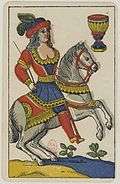Aluette
|
2 of Cups (the cow) from a 19th-century deck | |
| Origin | France |
|---|---|
| Alternative names | Luettes, La Vache |
| Type | Trick-taking |
| Players | 2-4 |
| Skills required | Tactics, Strategy |
| Cards | 48 |
| Deck | Spanish (modified) |
| Play | Clockwise |
| Playing time | 45 min. |
| Random chance | Moderate |
| Related games | |
| Put, Truc, Truco | |
Aluette is a plain trick-taking card game played usually by four people divided into two teams. It is played in rural and coastal areas in France between the Gironde and Loire estuary, that is to say, in the western part of the area of influence of Saintonge and Poitou dialect. It is wrongly presented as a folk and specific game in the Vendée department. It seems still practiced in the south-western part of the Loire-Atlantique called Retz. It is also practiced at family gatherings, at St Nazaire, city where we also played in cafes around 1960. At that time, there still were playing around the Brière and Guerande peninsula. It was much played in the ports of the Cotentin, where this game has disappeared.
This game is apparently very old with references to the game of "luettes" by François Rabelais in the early 16th century. As the cards use Spanish suits, it may even predate the invention of French playing cards around 1480. "La luette" means uvula in French and may refer to the fact that it is played with codified signs that allow team members to provide information on their cards during the game.[1] The game is also called "la vache" (the cow) because of the illustration on the 2 of cups card. Due to similarities it has with the game of truc, aluette may have been imported by Spanish merchants.
Cards
 3 of Cups (Madame) |
 2 of Coins (le Borgne) |
 2 of Clubs |
 Ace of Swords |
 5 of Coins |
 Knight of Cups |
Aluette uses a unique deck of 48 Spanish playing cards where certain pip cards depict figures to show that they outrank their face value. These figures provide the card with their nicknames and are associated with certain gestures players pass to their teammate. The card ranks are as follows:
The "Luettes":
- 1: Three of Coins (Monsieur/Mister) - look upwards
- 2: Three of Cups (Madame/Misses) - tilt head to the side
- 3: Two of Coins (Le borgne/the blind) - wink
- 4: Two of Cups (La vache/the cow) - pout a "moo"
The "Doubles":
- 5: Nine of Cups (Grand Neuf/Great Nine) - show the thumb
- 6: Nine of Coins (Petit Neuf/Small Nine) - show the little finger
- 7: Two of Clubs (Deux de chêne/Two of Oaks) - show the index and middle finger
- 8: Two of Swords (Deux d'écrit/Two of Writing) - mime writing
The "Figures":
- 9: Aces - open your mouth
- 10: Kings
- 11: Knights
- 12: Knaves
The "Bigailles": The remaining pip cards from the Nines of Swords and Clubs to the Threes of Swords and Clubs. The Five of Coins also includes a depiction of a couple kissing (believed to represent the Catholic Monarchs) and the traditional signal is to "kiss hard" but it has no special value.
Many of the illustrations on aluette decks appeared in other early Spanish packs but have since disappeared like the six-pointed stars on the Four of Coins.[2]
Grimaud, a subsidiary of Cartamundi's France Cartes, is the only producer of Aluette decks in the present. Since 1998, cards have included the nicknames, hinting gestures, and game ranking indices on their cards.[3]
Game play
The cards are dealt clockwise with each player getting nine cards and twelve cards should be left over. Alternatively, if all players agree, the remaining 12 cards can be dealt to the dealer and the player to his left. Each would then discard the six lowest cards in their hand.
Each round consists of nine tricks. The tricks taken are counted per person and not per team. At the end of the round, the player who has taken the most tricks brings a point for his team. If two players have the same number of taken tricks, the first player to have reached that number of taken tricks that wins the round. The player to the dealer's left becomes the next dealer and starts the next round until five rounds are played.
The player to the dealer's left leads the trick. Any card can be played but only the highest will win. If there is a tie, then the trick is spoiled and no one wins that trick. The player that wins or spoils the trick will start the next trick. Players can only communicate to their partner using subtle signals and gestures as described above.
A special rule is that any player who wins the last three tricks without having won the previous six ones will win the round and earn 2 points. This is making "mordienne". Players can signal their intention to make mordienne to their partner by biting their lips. Players who feel that they may have a bad hand can raise their shoulders signalling to their partner that they should give up. Surrendering is an option as it will award only one point to the opposition rather than two if mordienne was achieved.
References
- ↑ Pollett, Andrea.Aluette at Andy's Playing Cards (archived). Retrieved 19 April 2016.
- ↑ Pollett, Andrea.Spanish-suited cards at Andy's Playing Cards. Retrieved 19 April 2016.
- ↑ Aluette.net
External links
- Aluette rules at pagat.com
- Aluette rules at Ren Fest HQ
- Modern aluette cards at Alta Carta
- Pre-1998 Grimaud editions at World Web Playing Card Museum
- Cards from earlier manufacturers at aluette.net
